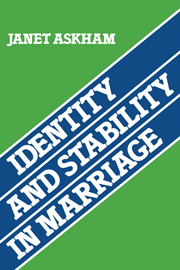Book contents
- Frontmatter
- Contents
- Preface
- 1 Prologue
- 2 Ways of looking at marriage: an introduction to the study
- 3 Knowing and talking to each other
- 4 Separate and joint activity
- 5 Constraints on behaviour within marriage
- 6 Changes in self and in activities
- 7 Relationships outside marriage
- 8 Conclusion
- Appendix 1 Sample selection
- Appendix 2 Interview guide
- Appendix 3 Profiles of the couples
- Glossary
- Bibliography
- Index
3 - Knowing and talking to each other
Published online by Cambridge University Press: 07 October 2011
- Frontmatter
- Contents
- Preface
- 1 Prologue
- 2 Ways of looking at marriage: an introduction to the study
- 3 Knowing and talking to each other
- 4 Separate and joint activity
- 5 Constraints on behaviour within marriage
- 6 Changes in self and in activities
- 7 Relationships outside marriage
- 8 Conclusion
- Appendix 1 Sample selection
- Appendix 2 Interview guide
- Appendix 3 Profiles of the couples
- Glossary
- Bibliography
- Index
Summary
Before discussing the five areas of behaviour in which identity and stability needs are expected to conflict it seems sensible to provide some introductory information about the marriages of the twenty couples in this study. The introductory topic chosen is the extent to which the marital partners feel they know one another. This is not a purely arbitrary topic but one chosen partly because it should help to show whether the marriages studied are sufficiently significant or important to the participants to allow them to seek identity or stability goals within them. If by chance a couple had been selected who were virtually strangers to each other, sharing the same house merely as a matter of convenience, they would be unlikely to be interested in, or affected to any great extent by, the actions or attitudes of each other, and would be furthering their identity and stability ends solely in relationships with other people. What follows will show that the sample did not include any relationships of this kind, although there was of course a certain amount of variation in the extent to which people felt they knew their marriage partner, or were known by him or her.
Knowing each other
Most people when asked how well they knew their partner and how well he or she knew them said that they knew each other very well (and it was a question they appeared able to answer with ease).
- Type
- Chapter
- Information
- Identity and Stability in Marriage , pp. 32 - 54Publisher: Cambridge University PressPrint publication year: 1984



